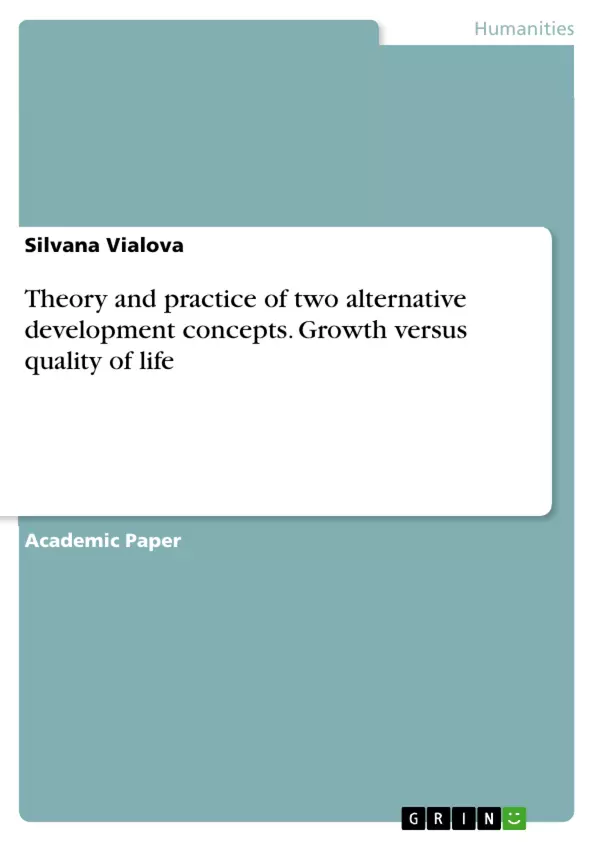This term paper presents two alternative development concepts originating from different cultural contexts and social positions, both aiming at generating another view on development including a conscious handling of the environment, social equality and a happy life in fullness. Conducting a comparative analysis of the two alternative development concepts – "Buen Vivir" (Ecuador) and "Gross National Happiness" (Bhutan) – the author tends to identify core aspects of both concepts and expound the countries’ strategies of implementation as well as their success and failures in doing so in order to eventually make a statement about the concepts’ potentials and limits.
Inhaltsverzeichnis (Table of Contents)
- Introduction
- Buen Vivir
- Context of emergence
- Content of Buen Vivir within the Ecuadorian Constitution
- Planned implementation
- Actual implementation: Yasuní-ITT-Initiative
- Gross National Happiness
- Context of emergence
- Content and Measurement
- Planned implementation
- Actual implementation: Driglam Namzha
- Comparison
- Similarities
- Differences
- Conclusion
Zielsetzung und Themenschwerpunkte (Objectives and Key Themes)
This term paper aims to analyze two alternative development concepts - Buen Vivir (Ecuador) and Gross National Happiness (Bhutan) - and their potential to represent a new thinking of development and sustainability. By examining the concepts' origins, planned implementation strategies, and actual outcomes, the paper seeks to identify their core aspects, strengths, and limitations.
- Alternative development models beyond economic growth
- Integration of social, environmental, and cultural well-being
- Indigenous cosmovisions and their influence on development concepts
- Comparative analysis of Buen Vivir and Gross National Happiness
- The role of government policies in implementing alternative development concepts
Zusammenfassung der Kapitel (Chapter Summaries)
- Introduction: The paper introduces the concept of development beyond economic growth and presents two alternative development concepts - Buen Vivir and Gross National Happiness - as examples. It also highlights the need for a more holistic understanding of development that encompasses social, environmental, and cultural aspects.
- Buen Vivir: This chapter explores the origins of Buen Vivir within Andean cosmovision and its adoption by the Ecuadorian government. It examines the concept's core principles and its impact on public policies, specifically through the Yasuní-ITT-Initiative.
- Gross National Happiness: This chapter examines the concept of Gross National Happiness, its roots in Bhutanese Buddhist culture, and its implementation strategies. It also analyzes the Driglam Namzha, Bhutan's code of ethics, as a concrete example of GNH policies.
Schlüsselwörter (Keywords)
The primary keywords of this text include: development, Buen Vivir, Gross National Happiness, alternative development, post-development, degrowth, indigenous cosmovision, Andean cosmology, Bhutanese Buddhism, sustainability, social well-being, environmental well-being, cultural well-being, government policies, implementation strategies.
Frequently Asked Questions
What is "Buen Vivir"?
Buen Vivir (Sumak Kawsay) is an alternative development concept from Ecuador based on indigenous Andean cosmovision, emphasizing harmony between humans and nature.
How does Bhutan measure development?
Bhutan uses the "Gross National Happiness" (GNH) index, which prioritizes psychological well-being, culture, and environment over simple GDP growth.
What was the Yasuní-ITT-Initiative?
It was a concrete implementation of Buen Vivir in Ecuador, aiming to leave oil in the ground in the Amazon in exchange for international compensation to protect biodiversity.
What is "Driglam Namzha"?
Driglam Namzha is Bhutan's official code of etiquette and dress, reflecting the cultural preservation pillar of the Gross National Happiness concept.
What are the similarities between Buen Vivir and GNH?
Both concepts reject purely economic growth models and seek a holistic approach to development that includes social equality, happiness, and environmental protection.
- Quote paper
- Silvana Vialova (Author), 2018, Theory and practice of two alternative development concepts. Growth versus quality of life, Munich, GRIN Verlag, https://www.grin.com/document/913382



